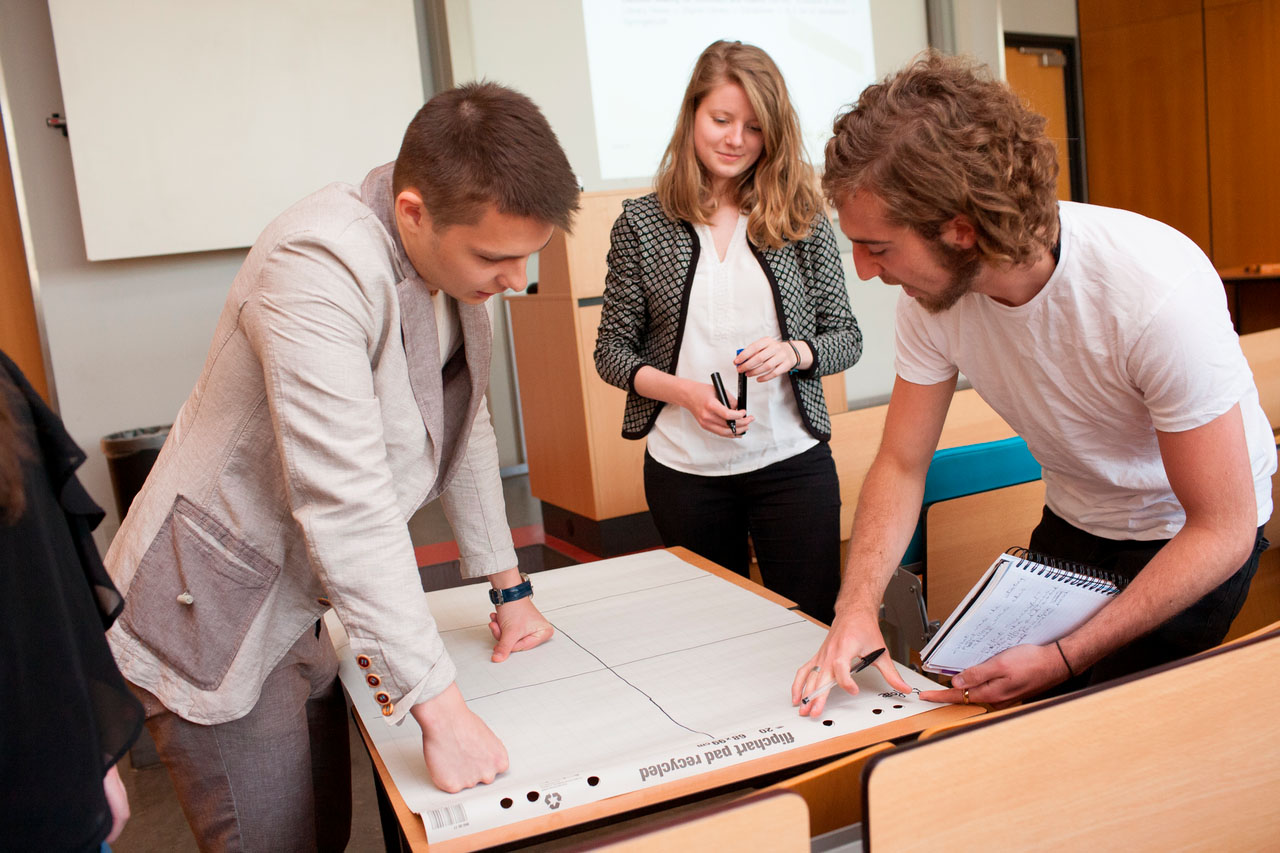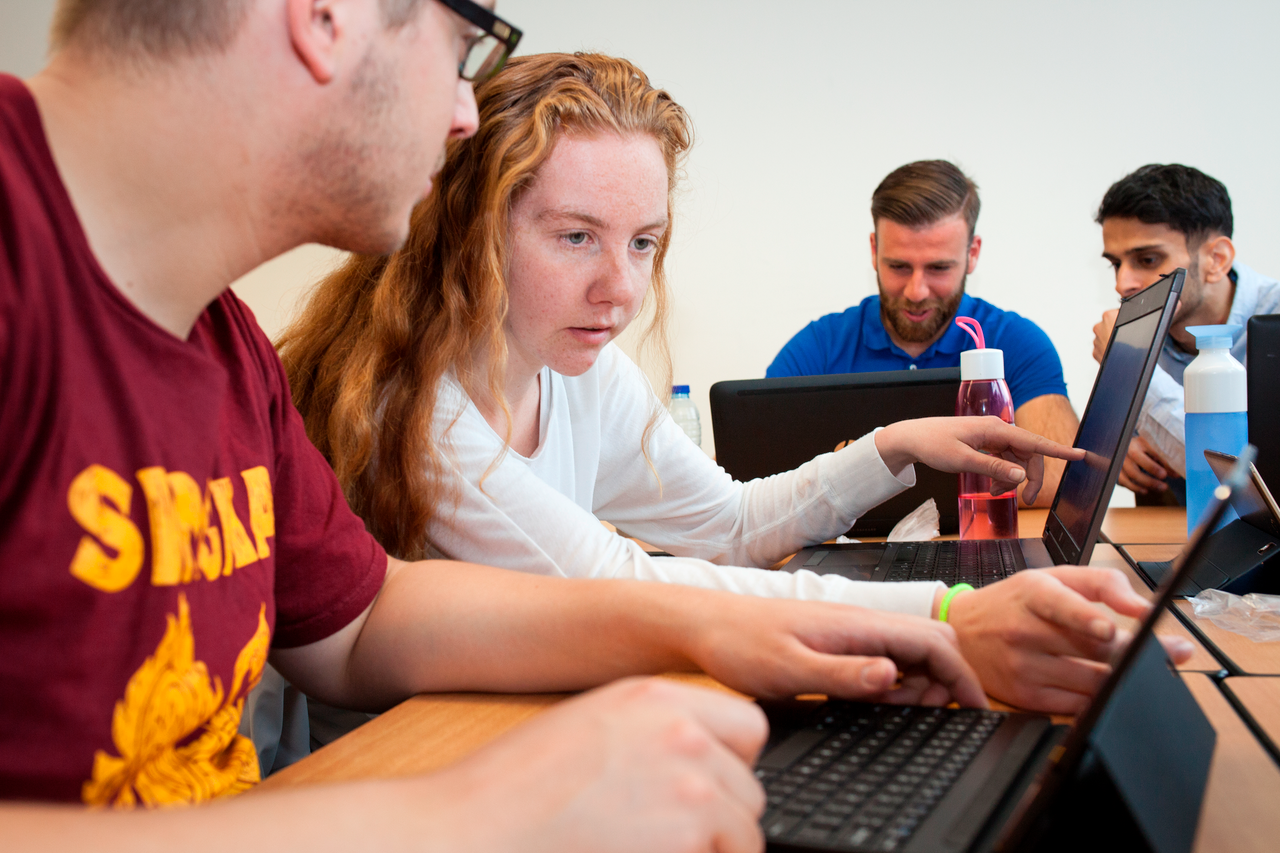For you?
Do you want to address global problems such as terrorism, violence, industrial hazards, and create a safer society? The Safety and Security Management Studies (SSMS) program, taught in English, is your gateway to making a difference.
Located in The Hague, the international city of Peace and Justice, this program equips you with the skills to think critically, perform under pressure, and assess risks effectively.
SSMS is built on three core pillars:
- Public Safety
- International Security
- Industrial QHSES (Quality, Health, Safety, Environment, Security/Sustainability)
In your second and third years, you’ll delve into contemporary safety and security issues, including hybrid warfare, transnational crime, health safety & environment. As a Safety and Security Manager, you’ll work on the front lines, often dealing with sensitive or classified information. This unique responsibility fosters a close-knit community of students and lecturers, united by a shared commitment to creating a safer society.
In 2021, Elsevier Magazine Best Studies awarded this degree program a bronze medal.
In 2022, Elsevier Magazine Best Studies awarded this program a silver medal
In 2023, Elsevier Magazine Best Studies awarded this program a silver medal.
Admission requirements
You have a Dutch diploma
| Vooropleiding | Vereiste profiel |
|---|---|
| Havo (senior general secondary education) |
|
| Vwo (pre-university education) |
|
| Mbo (senior secondary vocational education and training) | Level 4, middle management or specialised secondary education programme |
To begin the SSMS bachelor's degree programme, you should have a HAVO or VWO diploma with the appropriate profile. For some profiles certain subjects are required. You could also qualify for admission with a MBO (level 4) diploma.
You have a non-Dutch diploma
To enrol for the SSMS 4 year programme you will need a secondary school diploma comparable to a Dutch HAVO, VWO or MBO (level 4) diploma and a good command of English.
Before we can decide on your eligibility, we’ll need to assess your secondary school certificate.
To make sure your certificate is evaluated fairly, we work with NUFFIC, an organisation that specialises in the assessment of international education qualifications.
Language requirements
If you were not educated in the Netherlands you usually have to submit a language test to be admitted. Depending on the type and country of your diploma you may however qualify for exemption. Please check our entry requirements page for more information.
Don’t meet the entry requirements?
Perhaps your academic background is not quite the right level. Or you need some help improving your English skills. Don’t worry. There might be some alternative options to help you get in, and prepare yourself for a successful start of your studies at The Hague University of Applied Sciences (THUAS).
Admissions Test 21+
If you’re 21 years old before 1 September, but don’t have a diploma or a qualification that meets the entry requirements, you can take the 21+ Admissions Test. The 21+ Admissions Test is offered at several dates between January and the start of the academic year, and consists of a digital general capacity test. Please note that you can only participate if you have an EEA-nationality or residence permit for the Netherlands that is valid on the test date.
English Academic Preparation Programme
Need help with your English? If you haven’t quite reached the right level of English for your chosen Bachelor’s or Master’s degree programme, you can enrol for English Academic Preparation Programme. After the successful completion of this programme, you’ll be ready to start your degree at THUAS and you will already have a good taste of studying and living in the Hague.
Decisions regarding your qualification for admission
There are no exceptions to the official admission requirements. The Enrolment Office is the only party that can make decisions regarding your qualification for admission based on official regulations. You can’t rely on any other sources of information for your qualification for admission.
Discover THUAS
Your guide to our upcoming study-choice events
Degree programme in figures
Degree programme content
What will you do each year?
Working methods
Lectures, seminars, study visits, self-study, group activities and project work
SSMS is the first full-time bachelor programme in Europe to be taught in English. The strong sense of international community in the SSMS classroom will help you understand how different nations deal with safety and security - and where there is room for change.
Guest lectures
Guest lectures are given by seasoned practitioners with many years of experience in the intelligence community, NATO militaries, or national and international security and law enforcement organisations. And yes, their names and résumés can sometimes be as secretive as the work they do.
Excursions
During excursions in year two and three you’ll visit military bases and explore advanced prison systems, where you’ll see how the safety and security measures you learned about in year one are applied.
Professional tools
We’ll also teach you how to employ important professional practices, concepts and tools like the Roper methodology, the analysis of competing hypotheses (ACH), and the Gemba Walk for industrial sites.
Minors
Shape your degree
During year three, you’ll get the chance to specialise as a safety and security management professional in three minors. Choosing a minor gives you the opportunity to broaden your horizons, deepen your skills and fulfil your ambitions. As well as taking minors in the SSMS degree programme, you can follow THUAS minors at other faculties and even other institutions.
Intelligence Collection & Analysis
The minor Intelligence Collection & Analysis reflects the growing demand for intelligence analysts in foreign policy, law enforcement, military affairs, corporate security, and the natural resources and energy market. Students are familiarized with basic techniques of intelligence gathering, such as HUMINT, SIGINT, OSINT, GEOINT, and MASINT. They learn about (corporate) espionage and surveillance, counterintelligence and technologies used for the collection of information. In weekly exercises students practice the analysis of aerial and satellite imagery, use structured analytic techniques (SATs), conduct personnel security screenings, or observe and analyse counterintelligence interview techniques. Exercises are often conducted in cooperation with experienced professionals.
Health, safety and environmental (HSE) management
The Health, Safety, and Environmental (HSE) Management minor prepares students to manage HSE challenges across industries such as chemical production, aviation, construction, healthcare, and logistics. It starts with HSE risk analysis and roles like HSE Manager, Officer, and Safety Advisor. Key topics include Psychological, Social, and Organizational Safety, Fire Safety, Dangerous Goods Safety, Environmental Management, HSE Plans, and Training, with some units meeting VCA certification requirements.
The program combines theory and real-world applications through guest lectures on incident investigations, digital HSE management, and environmental due diligence, as well as site visits to companies like DFDS, Total Lubricants, and Renewi. Students conclude by developing an HSE plan, delivering training, and earning a VCA certification, equipping them to provide effective HSE guidance in professional environments.
Crime, Safety & Security
After completion of the minor ‘Crime, Safety & Security’ students acquire a more sophisticated understanding of major contemporary debates in criminology with reference to transnational organised crime, drug trafficking, human trafficking, crimmigration, cybercrime, corporate crime, safety crimes, environmental crime, plural policing, restorative and criminal justice and learn how to apply relevant criminological issues to policy questions. Throughout, use is made of international evidence/comparisons, and the case studies are chosen so as to give a feel for the diversity of approaches in the field of criminology and criminal justice. Each week of the minor completes with one of the following practical exercises: crime script analysis, social network analysis, situational crime prevention, cybercrime awareness simulation, multi-agency policing exercise in relation to domestic violence, mock trial. The minor is delivered in collaboration with guest speakers from Cybersecurity & SMEs Research Center (HHS), Netherlands Helsinki Committee, Rotterdam Detention Centre, CEPOL and EUROPOL.
Human Security
Human security is a concept that was first developed by the United Nations in the early 1990s. It can be applied in any context or sector, and hence this minor caters all students with an interest in alternative approaches to safety and security challenges. Human Security underlines the importance of the right of every person to live in peace (freedom from fear), meet their basic needs (freedom from want) and have their basic human rights fulfilled (freedom from indignity). In this minor, we will look at how human security was conceptualized and how it further developed as a framework and policy making tool that complements and strengthens other areas, such as the international human rights framework, development and conventional state-centric security strategies. During the final weeks of the minor will help students explore some potential career avenues with a HEAT (hostile environment awareness) training, a course in risk management for humanitarian workers and visits to civil society organizations (CSOs).
Terrorism & Counterterrorism
The minor Terrorism & Counterterrorism bridges the gap between practitioners and academia by integrating theoretical approaches to the topic with practical elements. Such practice-oriented components of the course include exercises in counterterrorist decision-making, introductions to weapons and tactics, and exposure to experienced practitioners in fields like military force protection, police counter-terrorism, or CBRN counter-proliferation. Students learn how to categorize terrorist groups and their organizational structures, learn about models of radicalization and de-radicalisation, and examine military doctrines like counterinsurgency. Students also study phenomena such as lone wolf attacks, the terror-crime nexus, or ISIS and their recruitment of foreign fighters.
At work
Is there anything I cannot be after I graduate?
As an SSMS graduate you’ll be highly employable in a range of exciting positions in various sectors, be it commercial, military or international government. Whatever career path you choose, it will be likely that you’ll be on the frontline dealing with people’s lives. In any case, you’ll be well qualified to identify risk situations and recommend, implement and evaluate feasible safety and security interventions. You could become a safety and security expert in the field of urban development and management, conflict mediation, or climb the career ladder at a police and security organisation, or within an international airport or insurance company. The opportunities are endless.
Career perspective
What you will become
Aviation Security Manager
Policy Advisor
Information Security Officer
Physical Security Advisor
Loss Prevention Specialist
Security Risk Analyst
Continue studying
If you’re academically minded, you may want to follow a master’s after graduating from SSMS in fields more related to crisis management, international relations or with a more business oriented curriculum. Outside the Netherlands, SSMS students can follow a master’s straight after graduation. You should note that some universities in the Netherlands require you to follow a pre-master’s course after graduating from THUAS.
Students of the Bachelor’s programme Safety and Security Management Studies (The Hague University of Applied Sciences) who fulfil specific academic and administrative criteria, and upon successful graduation from the programme, will have their application to the MSc programme ‘Crisis and Security Management’ of Leiden University accepted without further conditions. i.e. a Pre-master track will not be required.
Please note: those students also have to apply through Studielink and through the online application system. For more details you can contact Mr. Joery Matthys (at Leiden University) via [email protected]
For the specific academic and administrative criteria, please contact Mr. Huseyin Akdogan (at The Hague University of Applied Sciences) via [email protected].
More information on the admission requirements for the MSc programme Crisis and Security Management’ at Leiden University is also available here.
Practical information
What else do you need to know?
How to apply
Your enrolment request must be submitted through Studielink. Before you do, please check the official name of the programme below. Would you like to find out more about the application process first? Check our page How to apply . The key deadlines are listed here as well. This degree programme starts in September and there is no intake in February.
Tuition fee
You will have to pay tuition fees when you enrol on a bachelor's programme. You can pay in one or more instalments. If you pay in more than one instalment a small administration fee is charged.
More information about tuition fees
Scholarships
Find out more about scholarships for international students. Please note that these scholarships are one-off scholarships only, meaning that if you obtain them it is only for your first year of study.
Student finance
Dutch students qualify for extra financial support via a loan. Dutch students automatically qualify for this financial assistance and international students may be eligible if they have lived in the Netherlands for at least five years or are employed for at least 56 hours per month.
Additional Costs
You must also budget for books, excursions and field trips. You can expect to pay approximately €800 per year to cover these additional costs. During your semester abroad, you will also need to pay for tickets, housing and insurance.
Visa and residence permit
Help in choosing your study
We would like to help you make the right decision
It takes a bit of thought and research to find the right programme. The Hague University of Applied Sciences organizes various activities throughout the year to give you the best possible idea of the various studies offered. You also learn what it’s like to study at THUAS. This way, you can click on the registration button without a doubt in mind. Or you’ll know for certain it’s not right for you.
Walk in at our Study & Career Centre for…
Hulp tijdens je studie
Studeren doe je niet alleen
Je krijgt hulp bij het studeren. Aan het begin van je opleiding maak je kennis met je studieloopbaanbegeleider. Dat is altijd een docent van je opleiding. Je kunt bij hem of haar aankloppen als je vragen hebt. Over je studie, je stages, je carrière en nog veel meer. Ook volg je lessen studieloopbaanbegeleiding, waarin je leert studeren. Deze lessen vinden afwisselend klassikaal, in kleine groepen of individueel plaats. Heb je behoefte aan extra hulp? Bijvoorbeeld bij een dipje, ziekte, twijfels of iets anders? Dan ben je altijd welkom bij onze psycholoog, vertrouwenspersoon of decaan.
Voor meer informatie over decanen/studentpsychologen, topsport, ondersteuning bij de Nederlandse taal of studeren met een functiebeperking kijk op onze pagina over ondersteuning tijdens je studie.
Official details of the programme
This degree programme is registered in the Central Register of Higher Education Programmes (CROHO) as follows:
Official Dutch name of degree programme: Integrale Veiligheidskunde
Official international name: Safety and Security Management
Programme code (Isat): 39268
Institution code (Brin): 27UM
Both the official Dutch and the official international name of the degree programme (current at the time of your graduation) will be printed on your diploma.
For more information on the accreditation of this degree programme, see the Accreditation Organisation of the Netherlands and Flanders (NVAO) website.
Looking for a different degree programme?
You might find these programmes interesting too!




